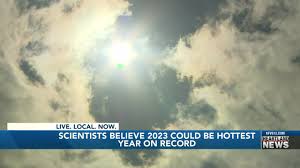From the Article by Scott Dance, Washington Post, September 15, 2023
There’s now a greater than 93 percent chance 2023 will surpass 2016 as the planet’s warmest year. After a record-hot stretch around the globe this summer, it appears all but certain: 2023 will surpass 2016 as Earth’s warmest year on record.
Scientists at the National Oceanic and Atmospheric Administration calculate that there’s a 93.42 percent chance that 2023 will become the hottest year according to a monthly climate report released Thursday. That percentage is nearly double what was estimated a month earlier (46.82 percent) and a whopping 86 percentage points higher than the beginning of the year projection (6.9 percent).
The calculation — with four months remaining in the year — underscores how dramatically observations of global air and ocean temperatures and ice extent have diverged from anything scientists have previously witnessed, or that they would have predicted at the start of the year.
Signs of unusual warmth began to appear in early spring, and the trend has not wavered since. July was the planet’s hottest single month on record, with possibly its most extreme sustained warmth in 125,000 years.
The three months from June through August were the globe’s hottest in 174 years of record keeping, 0.43 degrees (0.24 degrees Celsius) above the previous record and 2.07 degrees (1.15 degrees Celsius) above the 20th century average for Northern Hemisphere summer, according to NOAA’s National Centers for Environmental Information.
That affirms estimates European Union scientists released last week, declaring a record-warm summer “by a large margin.” Deke Arndt, the NOAA centers’ director, shared the report on X (the platform formerly known as Twitter) with an unusual declaration. “I’m rarely stunned by our findings,” he wrote. “Yesterday when the climate monitoring team briefed this, it took me five minutes just to process the magnitude.”
A new global temperature record began to appear possible when the climate pattern El Niño emerged in June — but scientists thought it would come in 2024. El Niño is associated with warmer-than-normal surface waters in the eastern equatorial Pacific Ocean, and is known for heating up the planet and fueling extreme weather.
A strong El Niño pattern that formed in 2015 and lasted into 2016 helped push the planet to record average warmth in 2016. But this year’s warming pattern has differed from the heat of 2016, said Robert Rohde, lead scientist for Berkeley Earth.
“Most of the time when you are building towards a new record, the weather is warm from the very start,” Rohde said in an email.” But this year, extreme temperatures did not emerge until June.
“That path towards record warmth is quite unusual,” Rohde said. Rohde and Berkeley Earth calculate there’s greater than a 99 percent chance that 2023 will be the warmest, a huge leap since the beginning of the year when they placed the odds at just 14 percent.
While El Niño may to some degree be responsible for the onset of this year’s warming, oceans are record-hot far beyond the epicenter of the El Niño pattern in the Pacific.
Heat in the Atlantic basin caused disastrous bleaching of Florida coral reefs and has aided the rapid intensification of hurricanes. Around Antarctica, during Southern Hemisphere winter, sea ice cover reached a maximum far smaller than any scientists have observed before.
Arndt noted that while some might seek to dismiss new extremes in a record book that goes back 174 years as “a blip in geological time,” he stressed they are nonetheless exceptional.
“Fact is, they are the most important, vital 174 yrs in the history of humanity’s relationship with the Earth system, when almost everything we know about agriculture and infrastructure was found or refined,” he wrote on X.
>>> Scott Dance is a reporter for The Washington Post covering extreme weather news and the intersections between weather, climate, society and the environment.
#######+++++++#######+++++++#######
Extreme Weather, September 14, 2023
What this month’s deadly floods tell us about our global climate future. The globe’s remarkable warmth — especially of its oceans, most of which have been running several degrees warmer than normal for months — served as a backdrop for all of the floods.
#######+++++++#######+++++++#######
NOTE ~ This Year 2023 Likely to be Hottest Year on Record. Phys.org
The average global temperature in June, July and August was 16.77 degrees Celsius, smashing the previous 2019 record. 2023 is likely to be the hottest year in human history, and global temperatures during the Northern Hemisphere summer were the warmest on record, the EU climate monitor said on Wednesday, September 6, 2023.

